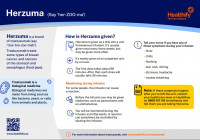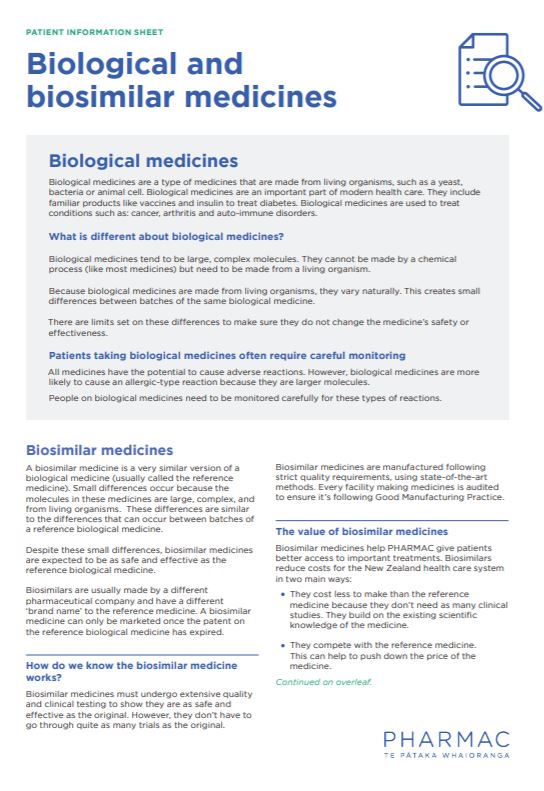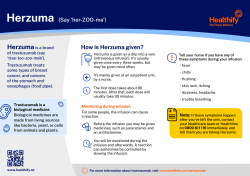You can now add Healthify as a preferred source on Google. Click here to see us when you search Google.
Trastuzumab
Say ‘tras-too-zoo-mab’
Key points about trastuzumab
- Trastuzumab is used to treat some types of breast cancer, and cancers of the stomach and oesophagus (food pipe).
- Trastuzumab belongs to a group of targeted therapies called monoclonal antibodies.
- Trastuzumab is known by the brand names Herceptin and Herzuma.
- Find out more about trastuzumab.

Trastuzumab is used to treat some types of breast cancer, and cancers of the stomach and oesophagus (food pipe). It may be used alone or together with other chemotherapy medicines to destroy cancer cells or slow down their growth.
- Trastuzumab belongs to a group of targeted therapies called monoclonal antibodies.
- It is called targeted therapy because it specifically controls cancer cells that have high levels of human epidermal growth factor receptor 2 (HER2). HER2 is found in all human cells.
- High levels of HER2 are found in some types of breast, oesophageal and stomach cancer, and that helps the cancer cells grow and survive. These are known as HER2 positive cancers. About 1 in 5 breast and stomach cancers are HER2 positive.
- Trastuzumab works by attaching to HER2 on the surface of the cancer cells and this stops the cancer cells from growing or multiplying. Trastuzumab also tells your immune system to destroy the cancer cells it's attached to.
Trastuzumab is a biological medicine
Unlike most other medicines that are made from synthetic or man-made chemicals, trastuzumab is made from living sources like bacteria, yeast, or cells from animals and plants.
There are 2 brands of trastuzumab available in Aotearoa New Zealand
- The original brand of trastuzumab is called Herceptin.
- From December 2023, a new brand of trastuzumab, Herzuma will be funded.
- Herzuma is a very close, but not identical, copy of Herceptin. It's called a biosimilar medicine. Read more about biosimilar medicines.
Factsheet: Herzuma
|
|
Herzuma (Trastuzumab) |
Trastuzumab is given as a drip into a vein (intravenous infusion)
- It's usually given once every 3 weeks, but can sometimes be given more often depending on your treatment.
- Your dose of trastuzumab depends on many factors, including your weight and type of cancer. Your doctor will work out your dose.
- The first infusion takes about 90 minutes. After that, each dose will usually take 30 minutes.
During the infusion
Trastuzumab is usually given by a nurse at an outpatient unit. For some people, trastuzumab can cause a reaction (called an infusion reaction) while it's being given so you’ll be carefully monitored during the infusion and for a time afterwards. Reactions are usually more common with your first infusion.
- Before the infusion you may be given medicines, eg, paracetamol and an antihistamine.
- Tell your nurse if you have any of these symptoms during your infusion:
- fever
- chills
- flushing
- skin rash, itching
- dizziness, headache
- trouble breathing.
Note: If these symptoms happen after you’ve left the unit, contact your healthcare team or Healthline on 0800 611 116 immediately and tell them you are taking Herzuma.
Here are some things to know when you're having trastuzumab. Other things may be important as well, so ask your healthcare provider what you should know about.
- Reaction during the infusion: Trastuzumab may cause an infusion-related reaction for up to 24 hours after you've received a dose. It’s important that you tell your doctor or go to the Accident and Emergency at your nearest hospital if you notice any unusual symptoms. See the information about an infusion reaction above.
- Heart problems: Trastuzumab can sometimes affect the heart. You will have regular tests before, during and after treatment to see how well your heart is working. Tell your doctor if you have a history of heart problems or high blood pressure.
- Increased risk of infections: Trastuzumab weakens your body’s defence (immune) system, so you're more likely to pick up infections. It's important to avoid anyone who has chickenpox or shingles.
- Pregnancy: You should avoid becoming pregnant while you're having trastuzumab and for at least 7 months after stopping treatment. Talk to your healthcare provider about which types of contraception are suitable for you and your partner.
- Vaccines: Some vaccines shouldn't be taken if you are on trastuzumab. Always check with your doctor or pharmacist first. It is safe for you to have the annual flu vaccine.
- Other medicines: Trastuzumab may interact with a few medicines and herbal supplements, so check with your doctor or pharmacist before starting trastuzumab or before starting any new medicines. This includes those you may buy over-the-counter.
Like all medicines, trastuzumab can cause side effects, although not everyone gets them. You may experience side effects at any time during your treatment or even months after treatment has finished. Most of the side effects of trastuzumab are likely to improve after you stop having treatment but some may last longer.
Note: Trastuzumab may also be used with chemotherapy, which can cause other side effects or make these side effects worse.
Note: To monitor your side effects, you'll need monitoring and blood tests to check your heart, liver, kidneys and blood before you start treatment and regularly while you're receiving treatment.
Common side effects |
|
If these side effects aren't getting better or are getting worse, report them to your oncology team immediately:
|
Rare, serious side effects |
|
For some people, these side effects could be life threatening. Call 111 for an ambulance if you have signs of an allergic reaction, such as trouble breathing, skin rash, or swelling of your face, lips, tongue, or around your eyes. If you have any of the side effects mentioned below OR any new or worsening symptoms, contact your healthcare team or Healthline on 0800 611 116 straight away:
Note: This is not a full list of side effects and side effects can vary for different people. If you don't know whether your symptoms are side effects of the medicine, contact your healthcare team straight away. |
The following links provide further information on trastuzumab:
Herceptin(external link) Medsafe consumer medicine information, NZ
Herzuma(external link) Medsafe consumer medicine information, NZ
Brochures
Herzuma [PDF, 85 KB] Healthify He Puna Waiora, NZ, 2023 English [PDF, 85 KB], te reo Māori [PDF, 216 KB], Samoan [PDF, 163 KB], Tongan [PDF, 285 KB], Chinese (simplified) [PDF, 242 KB]
Biological and biosimilar medicines(external link) PHARMAC, NZ
References
- Trastuzumab(external link) NZ Formulary, NZ
- Herceptin(external link) Medsafe datasheet, NZ
- Herzuma(external link) Medsafe datasheet, NZ
Brochures

Herzuma
Healthify He Puna Waiora, NZ, 2023
English, te reo Māori, Samoan, Tongan, Chinese (simplified)

PHARMAC, NZ

Medicines and side effects
Healthify He Puna Waiora, NZ, 2024
Credits: Healthify He Puna Waiora editorial team. Healthify is brought to you by Health Navigator Charitable Trust.
Reviewed by: Healthify clinical advisors
Last reviewed:






